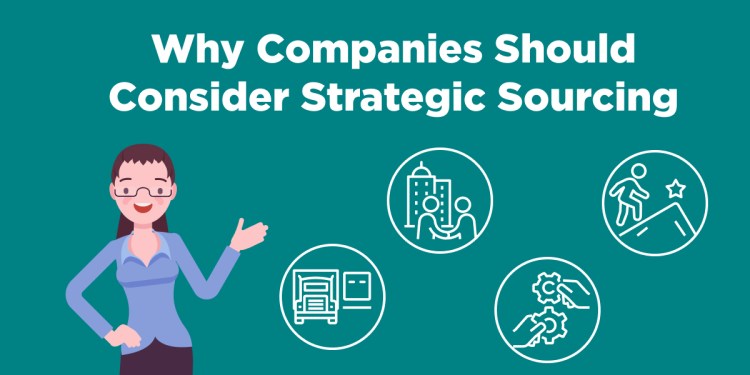Strategic Sourcing: How It Works and Why Companies Should Consider It
Last Updated July 26, 2023

In today’s competitive business climate, supply chain management professionals are constantly seeking out creative ways to reduce costs, assure and improve the quality of the final product and achieve a faster time to market. Strategic sourcing is one part of overall procurement management that can help achieve these supply chain goals. Here’s how it works:
1. Identify Suppliers

Effective procurement specialists and managers consistently locate the best quality materials at the lowest possible cost from the most reliable suppliers. When identifying and defining alternative suppliers, it is important to keep track of logistical considerations that may make one trade partner more beneficial at certain times of the year or under certain external conditions. This allows a consistent flow of products running smoothly throughout the year, independent of external conditions.
Another important consideration when identifying suppliers is competitive differentiation opportunity. Using a specific supplier that has a positive brand image with your consumers can create an excellent product differentiation opportunity, potentially leading the consumer to prefer your product over others. Common examples of this include the “Intel Inside” logo on personal computers and the “With 100% Sun-Maid California Raisins” seal that Post Cereals included on their Raisin Bran cereal package.
In an evolving global marketplace, using strategic sourcing tactics to identify the best suppliers can help companies maintain efficient and effective supply chains across all company divisions and partners.
2. Cultivate Relationships

Identifying the best suppliers is important. However, there is more to strategic sourcing. Cultivating a positive and long-term relationship by working closely with your suppliers can provide many win-win scenarios. Developing solid relationships can help sourcing professionals become better at meeting cost, speed-to-market, and quality goals, while allowing suppliers to more efficiently tailor and deliver materials to precise purchaser specifications.
We are now in an era where consumers can, in great part, drive the success of a company through their awareness and demand for ethical business practices. Creating and cultivating relationships with consumer-friendly suppliers creates opportunities for your company to improve product and company image via PR and marketing communication with consumers. Classic examples are Starbucks’ and Nespresso’s sustainable coffee programs and Patagonia’s organic cotton program.
3. Continuously Improve Skills

Procurement professionals and managers interested in maximizing strategic sourcing skills can expand their knowledge by taking online courses taught by industry leaders. Strategic sourcing is a field in constant development. Becoming proficient in this field and keeping your knowledge up-to-date, will help you understand, plan and implement a sound strategic sourcing strategy, tighten the effectiveness and efficiency of your supply chain infrastructure and reduce overall costs almost immediately. At the same time, a sound strategic sourcing strategy can create opportunities for your company to improve corporate image, increase sales and market share, and reduce costs.
4. Understand and Embrace the Possibilities

The implementation of strategic sourcing requires a wide variety of skills. Some of the top competencies needed to excel in making the most of a company’s strategic sourcing decision-making process include:
- Describing, recognizing and accessing key issues, principles, opportunities, strategies, techniques, and developments being pursued by the organization to achieve competitive advantage.
- Identifying internal and external challenges that affect sourcing strategy
- Defining and describing issues in global sourcing, e-procurement, the extended enterprise, negotiations, and ethics
- Identifying and applying decision-making frameworks and problem-solving skills to determine the best course of action pertaining to the above strategy areas
The expansion of the global marketplace in recent years has made it necessary for companies to take a more holistic approach to the integration of supply chain processes and overall business growth. Strategic sourcing is a specialty area whose potential and profitability is just beginning to be realized.
For supply chain managers looking to maximize the effectiveness of today’s complicated supply chains, strategic sourcing is a body of knowledge that can help increase efficiency and reduce costs. In order to remain competitive and relevant in today’s chaotic markets, it is necessary to utilize the most beneficial cutting-edge tools. Effective strategic sourcing can make a tremendous positive difference in the supply chain of companies of all sizes.

